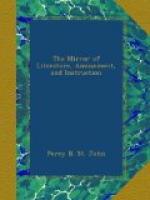Tullia.—Immortal gods! the house is now at the end of the telescope, and appears much larger than before.
Duke.—Well, madam, it is by means of such a toy that we have discovered new heavens, even as by means of a needle, we have become acquainted with a new earth. Do you see this other varnished instrument, in which is inserted a small glass tube? by this trifle, we are enabled to discover the just proportion of the weight of the atmosphere. After much error and uncertainty, there arose a man who discovered the first principle of nature, the cause of weight, and who has demonstrated that the stars weigh upon the earth, and the earth upon the stars. He has also unthreaded the light of the sun, as ladies unthread a tissue of gold.
Tullia.—What, sir, is it to unthread?
Duke.—Madam, the equivalent of this term will scarcely be found in the orations of Cicero. It is to unweave a stuff, to draw out thread by thread, so as to separate the gold. Thus has Newton done by the rays of the sun, the stars also have submitted to him; and one Locke has accomplished as much by the Human Understanding.
Tullia.—You know a great deal for a duke and a peer of the realm; you seem to me more learned than that literary man who wished me to think his verses good, and you are far more polite.
Duke.—Madam, I have been better brought up; but as to my knowledge it is merely commonplace. Young people now, when they quit school, know much more than all the philosophers of antiquity. It is only a pity that we have, in Europe, substituted half-a-dozen imperfect jargons, for the fine Latin language, of which your father made so noble a use; but with such rude implements we have produced, even in the belles lettres, some very fair works.
Tullia.—The nations who succeeded the Romans must needs have lived in a state of profound peace, and have enjoyed a constant succession of great men, from my father’s time until now, to have invented so many new arts, and to have become acquainted so intimately with heaven and earth.
Duke.—By no means, madam, we are ourselves, some of those barbarians, who almost all came from Scythia, and destroyed your empire, and the arts and sciences. We lived for seven or eight centuries like savages, and to complete our barbarism, were inundated with a race of men termed monks, who brutified, in Europe, that human species which you had conquered and enlightened. But what will most astonish you is, that in the latter ages of ignorance amongst these very monks, these very enemies to civilization, nature nurtured some useful men. Some invented the art of assisting the feeble sight of age; and others, by pounding together nitre and charcoal, have furnished us with implements of war, with which we might have exterminated the Scipios, Alexander, Caesar, the Macedonian phalanxes, and all your legions; it is not that we possess warriors more formidable than the Scipios, Alexander, and Caesar, but that we have superior arms.[8]




